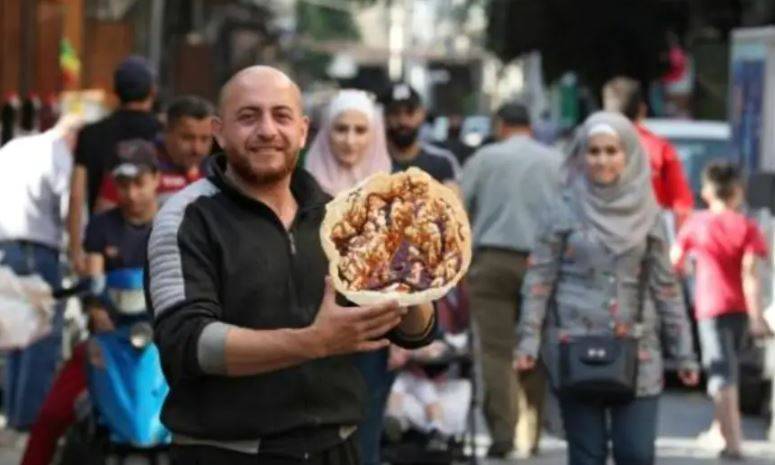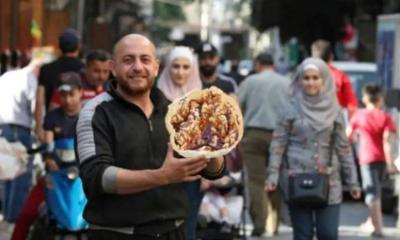Year after year, the components of the Ramadan table for the Abdullah family are dwindling, due to the repercussions of the economic crisis in Syria and the high cost of living. Only the popular dessert "Naeem" remains as one of the "steadfast" dishes, thanks to its low price compared to other sweets. Naeem, also known as "Ramadan bread," is primarily a mixture of flour, water, and oil, which is fried in boiling oil in the shape of loaves. Once crispy, they are set aside and garnished with grape molasses or dates, giving the dish its unique flavor.
During Ramadan, residents of Damascus are particularly keen to purchase Naeem from street vendors who occupy the sidewalks with large copper containers full of oil, preparing these sweets right in front of customers. As soon as Abdullah (51 years old) and his family finish their iftar in their home in Old Damascus, he hurries to get a crispy loaf of Naeem to share with his wife and two daughters. He tells AFP, "No matter how difficult the circumstances, Naeem remains a tradition that cannot be abandoned during Ramadan."
The price of a Naeem loaf in the capital's markets currently stands at around 2,500 Syrian pounds (less than a dollar), which is an affordable amount for Abdullah compared to the prices of most other sweets, where the price per kilo ranges from 10,000 to 50,000 Syrian pounds (about 17 dollars).
Like Abdullah, many families have been forced to forgo or reduce many essential dishes from the Ramadan table, such as red meats, chicken soup dishes, and sweets stuffed with pistachios. They have replaced them with cheaper ingredients or varieties. Abdullah, a government employee, says, “The children love this sweet very much, and that is the most important thing.”
In an annual tradition in the Juzaimiya market in the Midan neighborhood of Damascus, Abu Tariq (49 years old) displays more than twenty loaves, noting that the quantity he prepares daily sells out before iftar time. He remarks that sweets are "essential on the Ramadan table, and Naeem is the cheapest and tastiest." However, he also points out that his customers include both the poor and the wealthy, as consuming Naeem is a "tradition during Ramadan."
A few meters away from his stall, other shops display their wares of traditional Arabic sweets, stuffed with nuts and cooked with ghee, which are a source of pride in Syrian craftsmanship and entice anyone visiting Damascus. However, the number of patrons at these shops decreases annually due to their high prices. The price of pistachio-stuffed baklava is around 40,000 pounds, while the price of Shami barazek is about 20,000 pounds. As for Maamoul, the price per kilo ranges between 30,000 and 50,000 pounds, which is more than 15 times the price of Naeem.
Syria is experiencing a severe economic crisis, resulting from ten years of devastating war, exacerbated by Western sanctions, as well as the rapidly collapsing economy in neighboring Lebanon, where many Syrians, including businessmen, deposit their money. According to the UN, the majority of Syrians today live below the poverty line, with 12.4 million people facing food insecurity, according to the World Food Program.
Abu Tariq calls out loudly to promote his products. Two young helpers assist him in the preparation and decoration process. He says, “Naeem is a dish accessible to everyone; there is no flavor of Ramadan without tasting it.”




